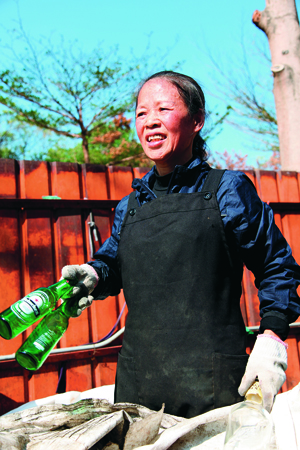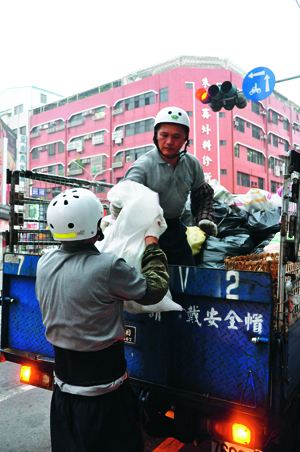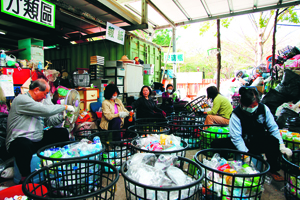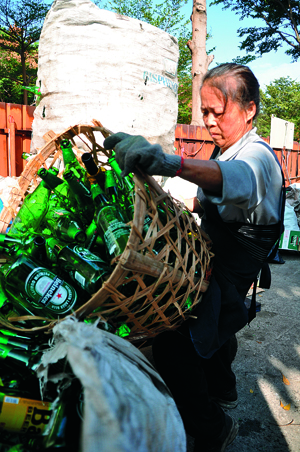

| Transforming Through Recycling | |||||||
| By Lin Bi-zhi and Xu Li-hua. Translated by Tang Yau-yang | |||||||
Unwilling to resign herself to her fate, she started all over, helped set up a new recycling station, and developed it into a gathering place where people work to extend the usefulness of discarded things. Volunteers that have worked to transform discarded items have witnessed their own lives transformed at the same time.
Photo by Wu Pei-jie At the Dingmei Recycling Station in Tainan, southern Taiwan, volunteers came in early, some at the crack of dawn. One of them backed up a truck while another stood nearby and yelled out to the driver to help guide the truck into position. Once it was in place, others helped unload it. Off to one side, still more volunteers were folding up newspapers, cutting plastic bags, and sorting out other recyclables. Su Yu-yun (蘇玉雲) was rinsing bottles when a volunteer walked by. “Morning, A-fen,” Su said warmly. “Have you eaten? There’s breakfast over there.” She is like a mother to many people who volunteer at the station. As usual, Su had been up since three that morning. She had ridden her motor scooter down many streets in the city, collecting recyclables. She arrived at the station a little after five with her goods and continued to work there. The Dingmei Recycling Station, which opened six years ago in 2009, is like a protective umbrella under which volunteers work together to help reclaim used goods and preserve the earth.
An emotional outlet Su and her husband, Lin Zhou-guan (林周管), used to run an electric appliance shop. They worked very hard, often well into the night, to earn enough to raise their three children. Over ten years ago, their oldest son fell in with some bad friends who abused his trust in them and broke his heart. He was down for a long time. Later on, he started a business with his girlfriend—only to have his girlfriend run away with their money. These successive blows led to severe depression; he could not even eat or sleep. His depression cast a pall over the whole family. Lin blamed Su for their son’s problem, saying that she had not been a good enough mom. He sought out a Tzu Chi volunteer to help them out. That was how Su was introduced to Tzu Chi and began volunteering. She volunteered at Dalin Tzu Chi Hospital, where she saw the unavoidable pain associated with illness or advanced age. She took up recycling, and there she also learned a lot. She began to see for herself that many things, even at the end of their usual lifespan, could still be used again. She saw that the fate of those things could be altered. In the same way, she figured the fate of her family could also be changed for the better. They had only to adjust their own outlook on life. Instead of dwelling on their son’s depression, they could learn to be happy by counting their blessings. Thus the couple decided to alter their own fate. After all, thinking negatively would not help things at all. With Lin’s support, Su became a very dedicated volunteer. She especially focused on recycling.
In July 2009, volunteers Huang Nan-ming (黃男溟) and his wife, Yang Hui-wen (楊惠雯), set aside a portion of their banana field for Tzu Chi to set up a new recycling station, which they named Dingmei. Su assumed the responsibility of managing it. All she had to work with in the beginning was a space about the size of two freight containers, about 320 square feet. The site was unpaved, so it would become really muddy after a rain, making loading or unloading very messy. She had no regular helpers, and she was often the only person working there. She often wondered why so few people were interested in doing the wonderful work of recycling. To keep up her spirits, she kept reminding herself what Master Cheng Yen taught: “When you know something is right, just do it.” “As a Tzu Chi volunteer, I must not flinch from giving my time and effort,” Su told herself. “I have to bravely commit myself and learn as much as I can about environmental protection.” She would rationalize for others who would not join her in her work: “That’s all right, they have more to do and I have more time. The more responsibility I take on, the more I’ll grow.” She hoped that gradually people would see the light and join in. Her persistence and good attitude paid off, and soon more people joined her.
Sure steps The Dingmei Recycling Station was located near many clothing wholesalers in Tainan. The wholesalers generated prodigious amounts of empty plastic bags from the clothes that they handled. These bags took up a lot of space and were a big headache for the merchants. Selling them was not a good option because they were not worth enough to warrant the trouble. The merchants often disposed of them elsewhere. In 2010, Su and other volunteers hit the streets to promote the recycling of plastic bags. When they asked businesses to donate their used and otherwise useless bags to the recycling station, many merchants eagerly agreed. Plastic bags have since become the most common item handled by the Dingmei station. With a regular inflow of bags, more volunteers joined the station to help and the station became livelier. Volunteers paved the ground of the station and built up the place. They also continued to invite more like-minded, eco-friendly people in the community to join their ranks. In addition to plastic bags, volunteers collected glass bottles, but some volunteers suggested to Su that they stop collecting them. They were so heavy, and they could be hazardous to transport too. When volunteers were trucking them to a buyer, their nerves were often on edge. A truck full of glass bottles could cause a lot of damage in an accident. Su would have loved to skip collecting bottles, but she believed they should keep collecting them for the benefit of the Earth. She learned from other recycling stations that commercial establishments would come to the recycling site and pick up bottles if there were sufficient quantities, so she decided to work toward that. First, she scavenged more than a dozen builder’s bags. Each was rated to hold up to between 7,000 and 9,000 kilograms (15,000-20,000 pounds). Then they began filling them up. Even though volunteers worked extra hard to collect bottles, it took them three months to fill those 12 bags. When all the bags were finally full, Su asked the buyer to come collect them.
Then one day when Su was riding down a road, she saw seven big baskets of empty beer bottles in front of a barbeque shop. She traveled farther down the road and saw more stores that had also put out their empty bottles. She felt like she had stumbled on a treasure. With permission from the owners, she got volunteers to come on a truck and collect all the bottles. She had found new sources that would provide a steady supply of glass bottles: bars, BBQ stores, seafood restaurants, and KTV parlors. What she needed now was strong backs to regularly collect the goods. Cai Chuan-hui (蔡串輝) and Wu Guo-cheng (吳國城) responded to the call. They checked with the stores that had agreed to give their bottles to Tzu Chi to arrange a pickup schedule. The store owners were happy to have reliable helpers pick up their bottles for free, and Tzu Chi volunteers were happy to do them a good turn for the sake of the environment. The city sanitation department required that bottles be removed by six o’clock in the morning or the businesses would face a fine, so Cai and Wu started their daily pickup at four. That gave them enough time to finish all the stores by the deadline. Because large amounts of glass bottles now regularly flow into the station, the recycling station bustles with the clank of glass and the chatter of people. That commercial company used to come in to pick up bottles once a month, but now it needs to come seven times a month. Su and the other volunteers at the Dingmei Recycling Station recycle up to 50 metric tons (110,200 pounds) of glass each month.
The three amigos Su Yu-yun is petite, not quite five feet tall, but she certainly appears anything but petite when she handles heavy things. Her dedication adds to her apparent stature. She is a giant who happens to be little. Huang Xi-lin (黃錫麟) began volunteering at the station after his youngest son took him there one day. When Huang saw Su dragging and lifting heavy loads of glass bottles, he was awed. “Wow, how does she do that?” Moved by her dedication, he decided to do his best to help protect the Earth too. He joined Wu Guo-cheng and Cai Chuan-hui, who had been picking up the glass bottles at stores. Since Wu is quite old, Huang felt all the more that he should help out. He now goes to bed at 11 p.m. and gets up early enough to start working the four o’clock collection route. He gets up even earlier on weekends to allow more time for pickups. Hong Su-rui (洪素蕊), Huang’s wife, is thankful that Su’s inspiring example has induced her husband to change. He used to smoke and drink, and he would gamble all night. “He used to return home at four in the morning to sleep,” his wife said, “but now he goes out at four to work.” His daily routine has been turned upside-down. He’s also quit smoking and drinking. “Su’s dedication to recycling touched a deep chord in me,” Huang said. “If it weren’t for that, I’d still be living aimlessly.” He added that he used to feel that liquor tasted like nectar, but now it smells repulsive, and that smell alone is enough to make him dizzy. “Now I go to bed early and get up early, I sweat, and I drink a lot more water. I just feel healthier now.” Su, however, is very grateful to the three-man team. “Loading and unloading glass bottles is very hard work,” Su said. “I don’t know what we would do if they weren’t around.”
A big family Su goes all out when it comes to volunteering for Tzu Chi, and she never turns down any work. She said that she used to put in such long hours that when she went home she was so tired, she literally had to crawl up the stairs. She recalled another sign of her dedicated work: “When I lay down and settled into bed, I’d begin feeling needle pricks in my fingertips. The skin there was so worn [from handling things] that I could see layers of new skin at different stages of growing back. Dirt became trapped under my fingernails all year round.”
Yet despite the exhausting work, she remains wholeheartedly committed to her mission. All she needs is a night’s sleep, after which she wakes up refreshed and ready for another day’s work. “I’d be lying if I said that the work isn’t tiring, but I just love recycling. I just can’t help it.” She has been hurt twice in traffic accidents during her years of service. One morning she was transporting glass bottles on a scooter when a taxi making a sharp turn caught her off guard and caused her to fall off her vehicle. Another time, she got hit by a drunken motorcyclist when she stopped her scooter not far from the recycling station to straighten and secure some recyclables that had shifted during the trip. “Fortunately, I wasn’t hurt too badly either time,” she said. Her feet were injured in one of the accidents, but she still limped into the recycling station afterwards to take care of things before she went to see a doctor. Later, her husband helped paste medicated patches on her to relieve her pain and soreness. “He did that for me over 30 times before I finally got better.” He was worried about her health, but she took the pain in stride. “I had much to learn about managing a recycling station. Besides, as manager, I had to set a good example for the others.” As she works, so do other volunteers. Early in the morning, they make their rounds to pick up glass bottles; during the day, they collect plastic bags at clothing wholesalers or beverage stores; around noon, they pick up fruit wrappers at markets…. The list of what they do goes on and on. In 2012, volunteer Wang Yue-xiu (王月秀) made a signboard that raised the visibility of the station. A lot more people have dropped off their recyclables at the station since the sign went up, so volunteers do not need to make their collection rounds so frequently. “There’s no way that I alone could have done what we’ve accomplished as a group,” Su said. “I’m grateful to everyone whose help has made the station what it is today.” She especially mentioned Huang Zheng-bang (黃政邦), a retired police officer. She thanked him for being the go-to person who supports every last need of the station. The volunteers at the station possess many talents. When the station needed Internet access, a volunteer emerged with just the right skills to set up the network. Since then, volunteers have been able to listen to Master Cheng Yen’s Dharma talks via videoconferencing. Jiang Yi-fen (江挹芬), a volunteer at the station, once underwent surgery for lung cancer. She felt very depressed about her illness. However, she found a new anchor for her life at the recycling station and has stopped pitying herself. “We sort things at the station while sharing Master Cheng Yen’s recent talks with each other,” Jiang said. “I’ve learned from those talks how impermanent life can be, and I’ve also come to realize that [compared with more unfortunate people] I’m actually quite lucky. I’ll make the most of my time by giving of myself.” “I’m grateful to the Master for giving us strength to carry on,” Su summed up. “We’ll continue to do our best and recruit more like-minded people to join us.” |

















|




